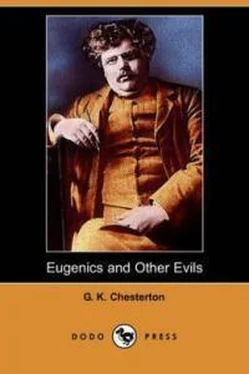Lastly, the literal maniac is different from all other persons in dispute in this vital respect: that he is the only person whom we can, with a final lucidity, declare that we do not want. He is almost always miserable himself, and he always makes others miserable. But this is not so with the mere invalid. The Eugenists would probably answer all my examples by taking the case of marrying into a family with consumption (or some such disease which they are fairly sure is hereditary) and asking whether such cases at least are not clear cases for a Eugenic intervention. Permit me to point out to them that they once more make a confusion of thought. The sickness or soundness of a consumptive may be a clear and calculable matter. The happiness or unhappiness of a consumptive is quite another matter, and is not calculable at all. What is the good of telling people that if they marry for love, they may be punished by being the parents of Keats or the parents of Stevenson? Keats died young; but he had more pleasure in a minute than a Eugenist gets in a month. Stevenson had lung–trouble; and it may, for all I know, have been perceptible to the Eugenic eye even a generation before. But who would perform that illegal operation: the stopping of Stevenson? Intercepting a letter bursting with good news, confiscating a hamper full of presents and prizes, pouring torrents of intoxicating wine into the sea, all this is a faint approximation for the Eugenic inaction of the ancestors of Stevenson. This, however, is not the essential point; with Stevenson it is not merely a case of the pleasure we get, but of the pleasure he got. If he had died without writing a line, he would have had more red–hot joy than is given to most men. Shall I say of him, to whom I owe so much, let the day perish wherein he was born? Shall I pray that the stars of the twilight thereof be dark and it be not numbered among the days of the year, because it shut not up the doors of his mother's womb? I respectfully decline; like Job, I will put my hand upon my mouth.
Chapter V
The Flying Authority
It happened one day that an atheist and a man were standing together on a doorstep; and the atheist said, "It is raining." To which the man replied, "What is raining?": which question was the beginning of a violent quarrel and a lasting friendship. I will not touch upon any heads of the dispute, which doubtless included Jupiter Pluvius, the Neuter Gender, Pantheism, Noah's Ark, Mackintoshes, and the Passive Mood; but I will record the one point upon which the two persons emerged in some agreement. It was that there is such a thing as an atheistic literary style; that materialism may appear in the mere diction of a man, though he be speaking of clocks or cats or anything quite remote from theology. The mark of the atheistic style is that it instinctively chooses the word which suggests that things are dead things; that things have no souls. Thus they will not speak of waging war, which means willing it; they speak of the "outbreak of war," as if all the guns blew up without the men touching them. Thus those Socialists that are atheist will not call their international sympathy, sympathy; they will call it "solidarity," as if the poor men of France and Germany were physically stuck together like dates in a grocer's shop. The same Marxian Socialists are accused of cursing the Capitalists inordinately; but the truth is that they let the Capitalists off much too easily. For instead of saying that employers pay less wages, which might pin the employers to some moral responsibility, they insist on talking about the "rise and fall" of wages; as if a vast silver sea of sixpences and shillings was always going up and down automatically like the real sea at Margate. Thus they will not speak of reform, but of development; and they spoil their one honest and virile phrase, "the class war," by talking of it as no one in his wits can talk of a war, predicting its finish and final result as one calculates the coming of Christmas Day or the taxes. Thus, lastly (as we shall see touching our special subject–matter here) the atheist style in letters always avoids talking of love or lust, which are things alive, and calls marriage or concubinage "the relations of the sexes"; as if a man and a woman were two wooden objects standing in a certain angle and attitude to each other, like a table and a chair.
Now the same anarchic mystery that clings round the phrase, " il pleut ," clings round the phrase, " il faut ." In English it is generally represented by the passive mood in grammar, and the Eugenists and their like deal especially in it; they are as passive in their statements as they are active in their experiments. Their sentences always enter tail first, and have no subject, like animals without heads. It is never "the doctor should cut off this leg" or "the policeman should collar that man." It is always "Such limbs should be amputated," or "Such men should be under restraint." Hamlet said, "I should have fatted all the region kites with this slave's offal." The Eugenist would say, "The region kites should, if possible, be fattened; and the offal of this slave is available for the dietetic experiment." Lady Macbeth said, "Give me the daggers; I'll let his bowels out." The Eugenist would say, "In such cases the bowels should, etc." Do not blame me for the repulsiveness of the comparisons. I have searched English literature for the most decent parallels to Eugenist language.
The formless god that broods over the East is called "Om." The formless god who has begun to brood over the West is called "On." But here we must make a distinction. The impersonal word on is French, and the French have a right to use it, because they are a democracy. And when a Frenchman says "one" he does not mean himself, but the normal citizen. He does not mean merely "one," but one and all. " On n'a que sa parole " does not mean " Noblesse oblige ," or "I am the Duke of Billingsgate and must keep my word." It means: "One has a sense of honour as one has a backbone: every man, rich or poor, should feel honourable"; and this, whether possible or no, is the purest ambition of the republic. But when the Eugenists say, "Conditions must be altered" or "Ancestry should be investigated," or what not, it seems clear that they do not mean that the democracy must do it, whatever else they may mean. They do not mean that any man not evidently mad may be trusted with these tests and re–arrangements, as the French democratic system trusts such a man with a vote or a farm or the control of a family. That would mean that Jones and Brown, being both ordinary men, would set about arranging each other's marriages. And this state of affairs would seem a little elaborate, and it might occur even to the Eugenic mind that if Jones and Brown are quite capable of arranging each other's marriages, it is just possible that they might be capable of arranging their own.
This dilemma, which applies in so simple a case, applies equally to any wide and sweeping system of Eugenist voting; for though it is true that the community can judge more dispassionately than a man can judge in his own case, this particular question of the choice of a wife is so full of disputable shades in every conceivable case, that it is surely obvious that almost any democracy would simply vote the thing out of the sphere of voting, as they would any proposal of police interference in the choice of walking weather or of children's names. I should not like to be the politician who should propose a particular instance of Eugenics to be voted on by the French people. Democracy dismissed, it is here hardly needful to consider the other old models. Modern scientists will not say that George III., in his lucid intervals, should settle who is mad; or that the aristocracy that introduced gout shall supervise diet.
Читать дальше








